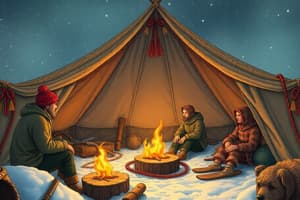Podcast
Questions and Answers
Which of the following is NOT a characteristic of effective leadership?
Which of the following is NOT a characteristic of effective leadership?
- Flexibility (correct)
- Fairness
- Instills confidence in others
- Good listener
What is the primary purpose of using a compass in outdoor navigation?
What is the primary purpose of using a compass in outdoor navigation?
- To measure the temperature
- To orient a map (correct)
- To track time
- To determine the altitude
Which of the following is an essential aspect of personal comfort during outdoor activities?
Which of the following is an essential aspect of personal comfort during outdoor activities?
- Having a large group
- Solo activities
- Appropriate clothing (correct)
- Excessive equipment
What type of skills is involved in negotiating during a group activity?
What type of skills is involved in negotiating during a group activity?
Which aspect is crucial for identifying personal strengths and weaknesses in an outdoor experience?
Which aspect is crucial for identifying personal strengths and weaknesses in an outdoor experience?
What is the primary benefit of understanding the ‘Leave No Trace’ principles?
What is the primary benefit of understanding the ‘Leave No Trace’ principles?
Which map feature is most critical for determining your location in the wilderness?
Which map feature is most critical for determining your location in the wilderness?
What characteristic is essential for effective leadership in outdoor activities?
What characteristic is essential for effective leadership in outdoor activities?
Which type of communication is most effective when working in a group during outdoor activities?
Which type of communication is most effective when working in a group during outdoor activities?
What role does risk-taking play in outdoor education?
What role does risk-taking play in outdoor education?
Which of the following is a biotic feature of a natural environment?
Which of the following is a biotic feature of a natural environment?
What strategy is important when navigating using natural indicators?
What strategy is important when navigating using natural indicators?
How does flexibility contribute to personal effectiveness in outdoor experiences?
How does flexibility contribute to personal effectiveness in outdoor experiences?
In group dynamics, what is typically the goal of assertion skills?
In group dynamics, what is typically the goal of assertion skills?
What is one major function of environmental management agencies in Western Australia?
What is one major function of environmental management agencies in Western Australia?
Flashcards are hidden until you start studying
Study Notes
Ropes
- Different types of ropes are used for various purposes.
- Rope care is vital for ensuring its durability and safety.
- Rope skills are needed for activities including climbing, rappelling and rescue scenarios.
- First aid and excursion/expedition preparation can benefit from specific rope skills.
Navigation
- Types of maps include topographic, nautical, and thematic maps.
- Maps display geographic features, elevations, and points of interest.
- Compass navigation is essential for accurate direction finding.
- Maps are oriented using a compass to align with specific points of reference.
Compass
- Compass components include the needle, housing, base plate, sighting mirror, and direction markings.
- Orienting a map with a compass involves aligning the map with the direction the compass is pointing.
Safety
- Personal comfort is vital for safe outdoor experiences.
- Safe practices and guidelines are specific to outdoor activities and minimize risk.
- Essential equipment protects against environmental hazards and injuries.
- Common outdoor illnesses/injuries require identification and proper treatment.
- First aid equipment should be properly selected, packed and readily accessible.
- Medical forms provide important health information for emergency situations.
Personal Skills
- Self-awareness, appraisal, goal setting, time management, flexibility, monitoring, reflection, commitment and self-concept are crucial personal qualities.
- Reflection on strengths and weaknesses helps with personal growth.
- Logbooks or journals document experiences and promote personal reflection.
Working with Others
- Communication skills, assertion, cooperation, collaboration, problem-solving, and negotiation are essential for working effectively in a group.
- Active listening and varied communication styles are crucial for effective teamwork.
- Effective groups are characterized by clear goals, shared responsibilities, and open communication.
Leadership
- Trustworthiness, fairness, openness, confidence-inspiring ability, and active listening are vital leadership qualities.
- Outdoor leaders often require specific skills and expertise based on the activity.
- Activity briefings are valuable for communicating instructions and safety protocols.
Ropes
- Types and care of ropes are essential for outdoor activities, first aid, and excursions/expeditions.
- Roping skills are crucial for safety and efficiency in these activities.
- Understanding different types of ropes and their appropriate uses is vital.
Navigation
- Maps are essential tools for orientation and navigation.
- Different types of maps exist, each with specific features and purposes.
- Using a compass to orientate a map is a fundamental skill.
- A compass has specific parts that need to be understood for proper use.
Safety
- Personal comfort is crucial for safety and well-being in outdoor activities.
- Safe practices and guidelines are necessary to minimize risks.
- Essential equipment and behaviours are required to protect oneself from environmental hazards.
- Identifying and treating common outdoor illnesses and injuries is vital for preparedness.
- Selecting, packing, and using appropriate first aid equipment is essential for emergencies.
- Completing medical forms is critical for emergency response.
Self and Others
- Self-awareness, self-appraisal, goal setting, time management, flexibility, monitoring, reflection, commitment, and self-concept are important personal skills for outdoor experiences.
- Identifying personal strengths and weaknesses helps individuals thrive in outdoor settings.
- Maintaining a logbook or journal allows for recording and reflecting on outdoor experiences.
- Effective communication, assertion, cooperation, collaboration, problem-solving, and negotiation skills are crucial for group success in outdoor environments.
- Active listening and various communication techniques enhance group cohesion.
- An effective group has specific characteristics and functions that optimize performance.
Leadership
- Trustworthiness, fairness, openness, instilling confidence, and active listening are key leadership qualities. These attributes are essential for leading outdoor activities effectively.
- Leaders in the outdoor realm possess specific qualities relevant to the environment and the activities they manage.
- An activity briefing is crucial for communicating information, setting expectations, and ensuring group preparedness.
Relationships with Nature
- Nature and natural environments hold diverse meanings and evoke various responses in individuals.
- Seeking outdoor experiences can be driven by a desire for connection with nature, adventure, and personal growth.
- Natural environments offer various characteristics that attract people, including tranquility, beauty, challenge, and solitude.
- Fear, appreciation, awe, and contemplation are common human responses to nature.
- The 'Leave No Trace' principle promotes responsible interaction with the environment, minimizing human impact on natural spaces.
Environmental Management
- Western Australian government environmental management departments and other local agencies play a crucial role in protecting and managing natural resources.
- Western Australian land management classifications include national parks, conservation parks, nature reserves, state forests, and marine parks.
- Each classification has specific rules, regulations, and guidelines for using the managed area for various outdoor activities.
Skills and Practices
- Developing a variety of skills is essential for effective participation in outdoor activities.
- Applying strategies in response to different outdoor situations is vital for adaptability and success.
- Basic outdoor first aid skills are crucial for handling minor injuries and illnesses during activities.
- Essential camping skills ensure comfort and safety when living outdoors.
- Basic navigation techniques, including using natural indicators of direction, maps, and feature-based navigation, are crucial for orientation and movement in unfamiliar territories.
Safety (further)
- Risk taking and challenge are integral parts of outdoor education.
- Risk, adventure, peak experience, challenge, chance, competence, and danger are concepts relevant to outdoor experiences.
- Simple risk assessment and management models, such as the traffic light model, aid in identifying and mitigating potential risks.
Working with Others (further)
- Assertion, cooperation, and collaboration skills enhance group performance and cohesiveness in outdoor activities.
- Establishing shared group goals promotes a sense of purpose and camaraderie.
- Understanding group dynamics allows for proactive management of group interactions and potential conflicts.
- Ground rules for effective group operation ensure that everyone is aware of expectations and boundaries.
Leadership (further)
- Designated, emergent, elected, and shared leadership styles represent different approaches to leading in outdoor settings.
- Autocratic, democratic, and abdicratic leadership styles have unique characteristics and implications.
- An activity debriefing serves to review the experience, identify areas for improvement, and facilitate learning.
Environmental Awareness
- Understanding abiotic (non-living) and biotic ( LIVING) features of a local environment is crucial for appreciating and managing the ecological system.
- Recognizing the interrelationships between the various features of a natural environment enhances ecological understanding.
- Synoptic charts provide valuable information about weather patterns, ocean currents, and other environmental factors that influence outdoor experiences.
Relationships with Nature (further)
- Cultural portrayals and media representations often shape people's perceptions of nature.
- Personal responses to risk vary among individuals and can be influenced by experience, personality, and situational factors.
- Technology plays a significant role in managing risk, providing tools for communication, navigation, and environmental monitoring.
- Understanding the relationship between humans and nature can be likened to developing interpersonal relationships, encompassing stages of attraction, acquaintance, friendship, and intimacy.
- Different individuals value nature in various ways, driven by factors such as beauty, tranquility, personal growth, or spiritual connection.
- The 'Leave No Trace' principle applies to minimizing human impact on the environment, respecting the natural world.
Environmental Management (further)
- Conservation and biodiversity are crucial for maintaining the health and resilience of ecosystems.
- Human activities can have significant positive and negative impacts on natural environments.
- Understanding the strategies used to manage specific environments promotes responsible practices.
Studying That Suits You
Use AI to generate personalized quizzes and flashcards to suit your learning preferences.




